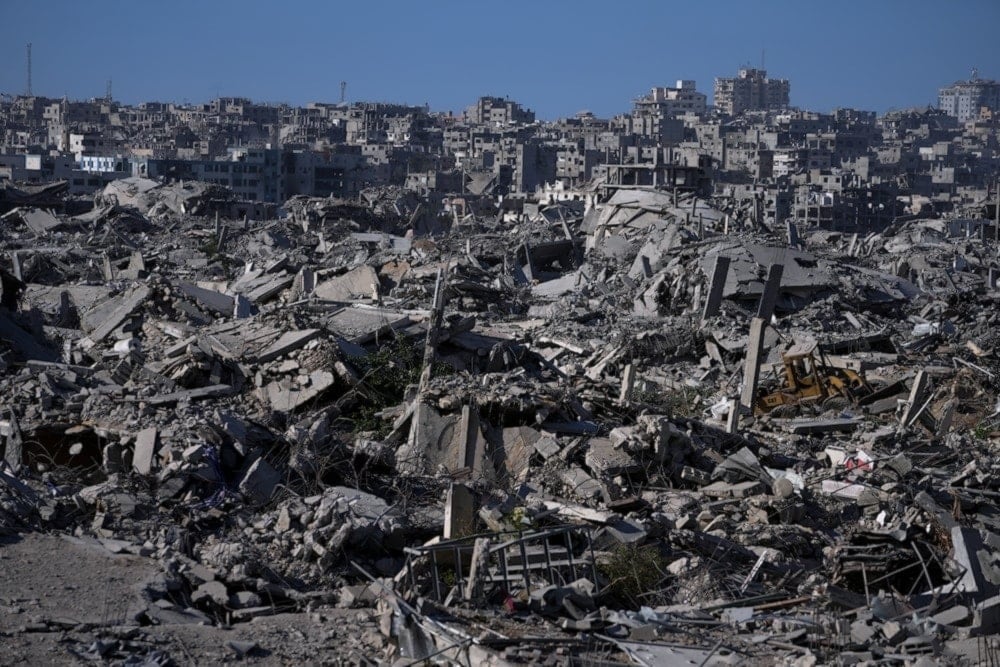MENA journalists in US report heightened scrutiny since Gaza war began
A new AMEJA survey reveals rising pressure, bias, and self-censorship faced by Arab and Middle Eastern reporters in major US newsrooms.
-

Destroyed buildings and rubble are seen in the al-Zaytoun neighborhood of Gaza City, Friday, October 10, 2025 (AP)
In the months following "Israel’s" genocide in Gaza, many journalists of Arab and Middle Eastern descent working in US newsrooms say they have faced an unprecedented level of scrutiny.
According to a recent survey by the Arab and Middle Eastern Journalists Association (AMEJA), nearly seventy respondents described experiencing heightened pressures since October 2023. The organization released its findings as a ceasefire took effect, an opportune moment, AMEJA noted, to reassess how the war has been covered in Western media.
“We put together a survey because, as journalists, we always try to uncover the truth,” said Aymann Ismail, AMEJA president and a staff writer at Slate. “Rather than talk about it, we wanted to see what the actual metrics were, and we wanted to see if this is something that was being experienced across the board.”
Survey highlights bias, uneven standards
The survey’s findings were revealing. Sixty-eight percent of respondents said they had noticed changes in how editors framed or assigned coverage related to the Middle East. Eighty-five percent reported that their reporting on the Middle East and North Africa (MENA) region was held to a “higher standard of neutrality.”
Nearly three-quarters felt that standards of objectivity were applied inconsistently, often depending on a journalist’s background or identity. Meanwhile, 75 percent admitted to self-censoring their language or reporting out of fear of backlash, and 44 percent said they had encountered increased online harassment.
AMEJA, which fosters community among journalists from or covering the MENA region, interpreted the data as evidence of a news culture shaped by suspicion and apprehension. Ismail attributed much of this tension to leadership structures within newsrooms: sixty percent of participants said they believed MENA journalists were underrepresented in managerial or editorial positions.
“There is a correlation here, especially when we look at who is assigning, editing, and fact-checking stories,” he said.
Solutions, path forward
While some of the problems are systemic, Ismail said others can be addressed through practical measures. For example, to mitigate online harassment, he suggested that media outlets help employees protect their privacy by removing personal data from the internet.
“These are solvable issues,” he said. “By presenting them, we’re going to find a lot of alignment and agreement in the journalism world that this is a problem, and that this does need to be addressed, not just for the sake of reporters, but for the sake of improving the journalism being produced about the region in the first place.”
Though roughly a hundred people initially responded to the survey, AMEJA narrowed the focus to those identifying as Arab or Middle Eastern. Ismail stressed that identity and cultural understanding can enrich reporting.
“Having somebody who is Arab or Middle Eastern report on these regions gives publications a special kind of access,” he said.
“That’s not to say you need to be Arab or Middle Eastern to report on the Middle East, but if you have somebody who already speaks the language, who grew up steeped in the culture, who might understand some of the informal cultural aspects of the community they are reporting on, you might then create a situation where you’re able to get better quotes, and better access to a community,” he further concluded.
Read more: US media rejects Pentagon rules limiting access to official info

 4 Min Read
4 Min Read










